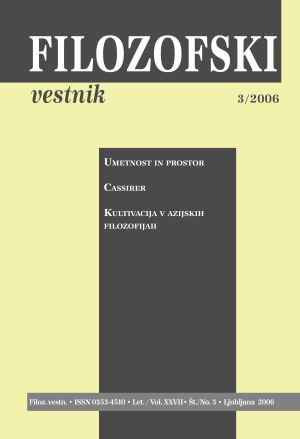Cassirerjeva filozofija simbolnih form
Ključne besede:
Cassirer, Kant, Hegel, Einstein, simbolne formePovzetek
Osrednja tema članka je analiza Cassirerjevega pojma simbolne forme. Cassirer v svoji znani trilogiji Filozofija simbolnih form (1923–29) ni opredelil tega pojma eksplicitno, pač pa kontekstualno, večpomensko, implicitno, saj »simbolna forma« v tem sistemu nastopa kot njegov »prvotni« pojem (analogno kot prvotni pojmi v aksiomskih sistemih). kljub temu pa avtor članka oblikuje opisno oznako simbolne forme, poudarjajoč predvsem njeno integrativno funkcijo za povezovanje različnih spoznavnih sfer in ravni, zlasti za preseganje nasprotij med naravoslovjem in kulturoslovjem. V drugem delu članka pa se avtor posveča dvema bolj specifičnima problemskima sklopoma: 1. vplivu Einsteinovega (in Kleinovega) pojma invariantnosti na Cassirerjeve simbolne forme; 2. Heglovim vplivom na Cassirerjevo zgodovinskorazvojno formulacijo novokantovstva, pri čemer avtor ugotavlja, da Cassirer sicer opušča Heglov logicizem in njegovo dialektično pojmovanje zgodovine, ki kulminira v absolutnem védenju, po drugi strani pa ostaja v paradigmi »stopnjevitega« modela spoznanja, ki doseže najvišjo stopnjo, seveda drugače kot pri Heglu, v eksaktni znanosti in matematiki – tj., v posodobljeni Leibnizevi mathesis universalis.Prenosi
Podatki o prenosih še niso na voljo.
Prenosi
Objavljeno
2016-03-05
Kako citirati
Uršič, M. (2016). Cassirerjeva filozofija simbolnih form. Filozofski Vestnik, 27(3). Pridobljeno od https://ojs.zrc-sazu.si/filozofski-vestnik/article/view/4377
Številka
Rubrike
Cassirer
Licenca
Avtorji jamčijo, da je delo njihova avtorska stvaritev, da v njem niso kršene avtorske pravice tretjih oseb ali kake druge pravice. V primeru zahtevkov tretjih oseb se avtorji zavezujejo, da bodo varovali interese založnika ter da bodo povrnili morebitno škodo.
Podrobneje v rubriki: Prispevki





